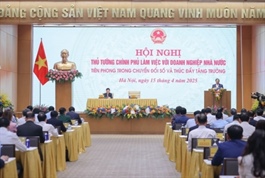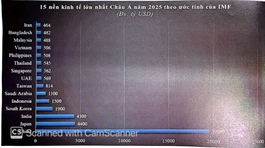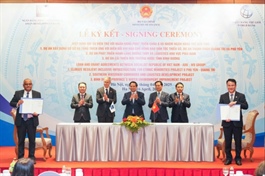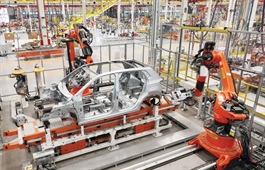Next-generation free trade zone and visa incentives proposed for Hải Phòng development
Next-generation free trade zone and visa incentives proposed for Hải Phòng development
One of the most notable provisions of the draft resolution for Hải Phòng City’s development is the exemption of visa requirements and the issuing of 10-year temporary residence cards for foreign experts, scientists and high-skilled professionals, along with their families, who work for businesses operating within the next-generation Free Trade Zone.
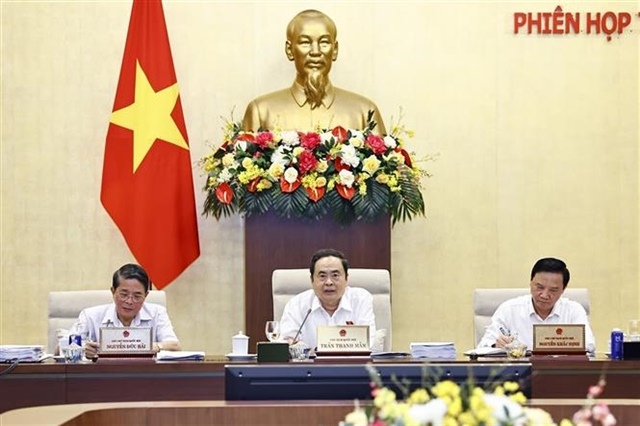
National Assembly Chairman Trần Thanh Mẫn speaks at the 44th session of the National Assembly Standing Committee on Thursday. — VNA/VNS Photo |
A draft resolution presented to the National Assembly (NA) yesterday proposed six key policy groups to remove development bottlenecks and accelerate Hải Phòng City’s growth, centred around the pilot launch of a next-generation Free Trade Zone (FTZ), featuring exceptional incentives to attract global talent and investment.
One of the most notable provisions is the exemption of visa requirements and the issuing of 10-year temporary residence cards for foreign experts, scientists and high-skilled professionals, along with their families, who work for businesses operating within the FTZ.
The proposal was discussed during the 44th session of the National Assembly Standing Committee, which reviewed the draft resolution intended to replace Resolution No. 35/2021/QH15 on piloting special mechanisms and policies for Hải Phòng’s development.
Minister of Finance Nguyễn Văn Thắng, who presented the draft, stated that the new resolution is intended to clear systemic barriers and accelerate Hải Phòng’s economic growth, with spillover benefits for the broader Red River Delta region, along with the national economy.
He emphasised that the proposed direction is in line with long-term goals set by the Politburo’s Resolution No. 45-NQ/TW and Conclusion No. 96-KL/TW on the city’s development by 2030, with a vision toward 2045.
According to Thắng, the draft encompasses six major policy areas comprising 41 specific measures, which cover investment management; financial and state budget oversight; urban planning, natural resources and environmental management; science, technology and innovation; and income and incentive structures for Hải Phòng’s public officials and civil servants.
A key highlight is the pilot launch of a new-generation FTZ in Hải Phòng, which would serve as a flagship model for innovation, open economic engagement and global competitiveness.
The zone will be organised into functional sub-zones, including manufacturing, port and logistics, commercial-service areas and other types of working areas in accordance with Vietnamese law.
The draft resolution proposed delegating authority to the Hải Phòng People’s Council to decide on the establishment, expansion and adjustment of the FTZ’s boundaries, linking it to the Đình Vũ – Cát Hải Economic Zone and the Southern Coastal Economic Zone in Hải Phòng, similar in function to industrial parks.
This policy will provide a legal framework to pilot innovative mechanisms with the potential to unlock new growth drivers, especially in investment, finance, trade and advanced industry, while also serving as a magnet for foreign talent and researchers.
Reviewing this proposal, Chairman of the NA's Economic and Financial Committee Phan Văn Mãi affirmed the necessity of such a pilot initiative, saying it reflects the strong political will of both the Hải Phòng authorities and the Government.
However, he cautioned that this is a complex issue, not just economic in nature, but also with implications for national defence, security and public order.
He urged that the potential impacts on economic growth, the State budget and society be clearly analysed, along with the zone's regional impacts, risk management mechanisms, oversight structures and clear assignment of responsibilities among related parties.
As per the Resolution of the 11th Plenum of the Party Central Committee, Hải Dương Province is set to merge with Hải Phòng, with the unified entity to be called Hải Phòng City.
On this matter, Chairman of the NA’s Committee for Legal and Judicial Affairs Hoàng Thanh Tùng raised concerns about the city’s impending expansion. He noted that the application of pilot mechanisms and special policies should not be unique to Hải Phòng, but should also extend to HCM City, Đà Nẵng and other localities.
He recommended that the Government Party Committee seek the Politburo’s guidance on whether existing pilot mechanisms should remain in effect after mergers or administrative restructuring.
Deputy Chairman of the NA Nguyễn Khắc Định echoed this, urging the Government to submit a formal request to the Politburo for approval to expand the scope of these pilot policies to all cities and provinces undergoing mergers, such as HCM City, Đà Nẵng, Cần Thơ and Khánh Hòa.
NA Chairman Trần Thanh Mẫn supported the idea, proposing that the Government immediately seek the Politburo’s approval to maintain the current special mechanisms for localities undergoing mergers and expansions. This would allow for swift decision-making during the 9th session of the NA, especially concerning Hải Phòng's incorporation of Hải Dương, ensuring consistent application across equivalent administrative units.
Regarding incentives for foreign experts working within the FTZ and related enterprises, Deputy Prime Minister Hồ Đức Phớc said that the Government would clearly define criteria for experts, scientists, individuals with exceptional talents, and executives to prevent abuse or misuse of the preferential policies.
The draft resolution on piloting special mechanisms and policies for Hải Phòng's development is scheduled to be submitted to the NA for review and approval during its 9th regular session, which opens on May 5.
- 16:00 17/04/2025



